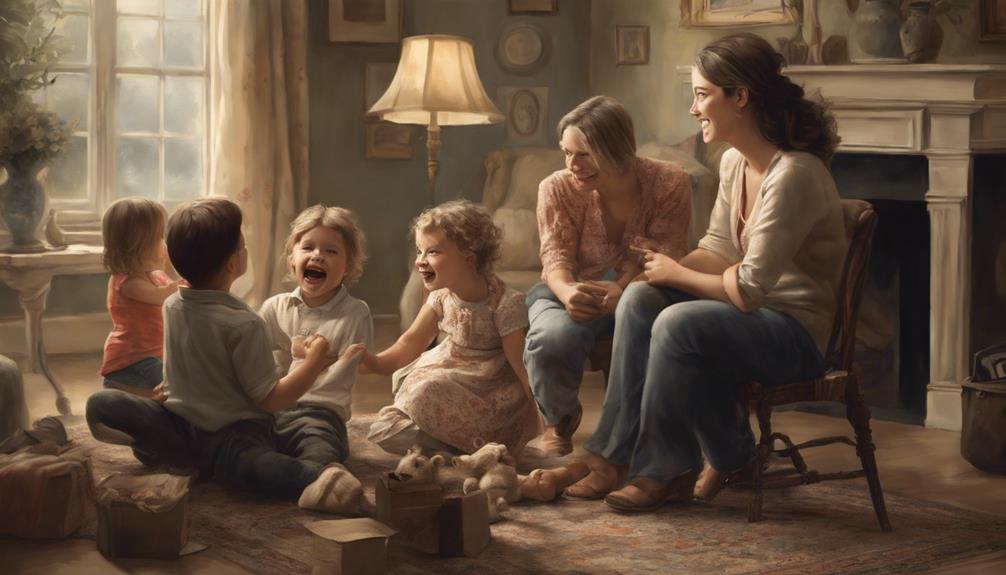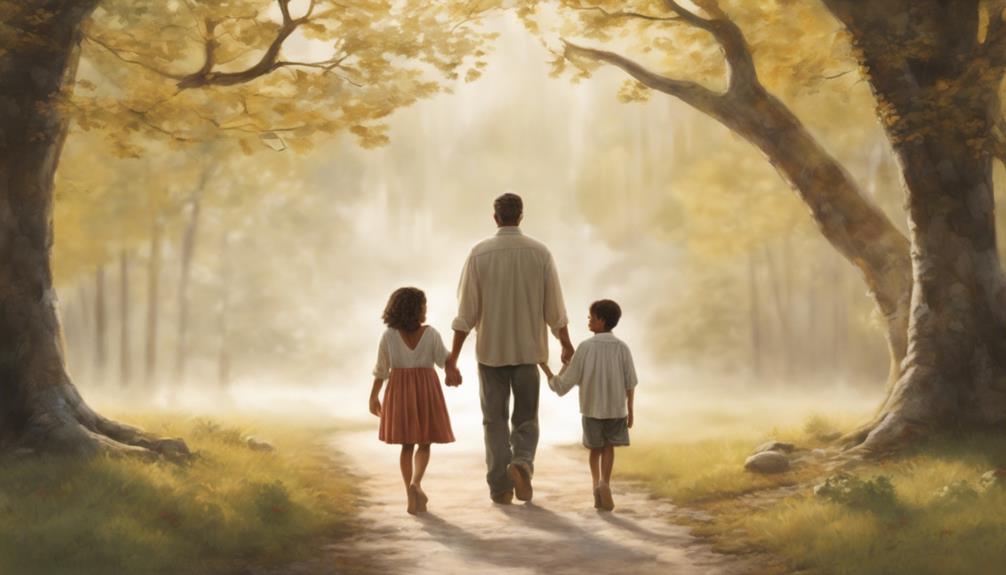As we dip our toes into the vast ocean of reasons behind the disdain for the childfree lifestyle, it becomes evident that the tide of judgment and societal pressures runs deep.
However, beyond the surface, intricate layers of fear, insecurity, and tradition intertwine to form a complex web of emotions that drive some to harbor animosity towards those who choose not to have children.
But what lies beneath this intricate tapestry of beliefs and perceptions? Let's explore the uncharted depths to uncover the hidden motivations that fuel this contentious debate.
Key Takeaways
- Societal pressure to conform to traditional norms fuels hate towards the childfree lifestyle.
- Misconceptions about happiness and selfishness provoke negative attitudes towards childfree individuals.
- Fear of aging alone without children contributes to the disdain for the childfree choice.
- Legacy, family traditions, and cultural pressures lead to animosity towards those who reject parenthood.
Societal Expectations
Why do societal expectations often lead to criticism and backlash against those who choose a childfree lifestyle? It's a question that many childfree women like us grapple with daily. Society's insistence on adhering to traditional norms of marriage and parenthood creates immense pressure for individuals to conform. As childfree women, we face societal expectations that dictate our worth is tied to motherhood, perpetuating the idea that choosing not to have children is selfish or abnormal.
The pressure to fulfill these traditional roles often results in misunderstandings and judgments towards those of us who opt for a childfree lifestyle. People struggle to comprehend that our decision is valid and fulfilling in its own right. The stigma and hate directed at childfree individuals stem from society's narrow definition of happiness, one that equates it with parenthood. By challenging these societal expectations, we pave the way for a more inclusive and understanding world where every choice is respected.
Misconceptions About Happiness

Challenging societal norms, we debunk misconceptions about happiness surrounding the childfree lifestyle by highlighting research-backed evidence of increased life satisfaction among childfree individuals. Contrary to what some people think, happily married childfree individuals often experience a deep sense of fulfillment and contentment in their relationships.
- Stronger Marital Bonds: Research shows that childfree couples tend to have more time and energy to invest in their marriages, leading to stronger emotional connections and overall happiness in their relationships.
- Freedom to Pursue Goals: Without the responsibilities of raising children, childfree individuals have the freedom to pursue their personal goals and passions, contributing to a higher sense of fulfillment and satisfaction in life.
- Enhanced Social Connections: Childfree individuals often have more time to nurture relationships with family members and friends, leading to a strong support network that boosts their emotional well-being and overall happiness.
These findings challenge common misconceptions and shed light on the happiness that can come from choosing a childfree lifestyle.
Fear of Aging Alone
We fear aging alone because we worry about lacking support, facing loneliness in old age, and missing out on caregiving that children often provide.
It's a common concern among those who choose not to have kids, as societal expectations tie parenthood to eldercare.
These worries can lead to negative attitudes towards childfree individuals who opt out of traditional family structures.
Aging Without Support
A common fear among individuals embracing the childfree lifestyle is the prospect of aging without the traditional support system that children often provide. This concern can lead to anxiety about facing the challenges of growing old without the assistance and care typically expected from children. The thought of managing health, finances, and daily needs alone can be daunting for those who've chosen not to have kids. According to the Washington Post, the fear of aging without support is a significant factor influencing perceptions of the childfree lifestyle.
Feeling lonely and isolated without children to rely on.
Worries about not having someone to care for them in old age.
Challenges in managing health, finances, and daily needs without children's assistance.
Loneliness in Old Age
Studies indicate that childfree individuals are more susceptible to loneliness in old age due to the absence of children to offer care and support. The fear of aging alone can be daunting, as the natural support system that children often provide is missing.
Without offspring to lean on, childfree individuals may find themselves facing increased social isolation and a limited social circle as they grow older. The thought of navigating the later years without the companionship and assistance of children can lead to heightened concerns about loneliness.
The absence of children in old age can contribute to feelings of isolation and vulnerability, sparking worries about aging solo.
Lack of Caregiving
In contemplating old age, the absence of children as caregivers looms as a stark reality for some individuals who choose the childfree lifestyle. This fear of aging alone without the traditional support system that children often provide can lead to negative perceptions of those without offspring.
Here are three reasons why the lack of caregiving in later years can be a point of contention for some people:
- Dependency Expectations: Society often expects children to care for aging parents, causing concern for childfree individuals about who'll support them.
- Criticism and Judgment: Those without children may face criticism for not conforming to societal norms regarding caregiving.
- Anxiety About the Future: The uncertainty of who'll provide assistance in times of need can create anxiety and fear of aging alone.
Pressure to Conform

We all know that societal norms can be incredibly powerful. This pressure to conform can be particularly intense when it comes to expectations surrounding marriage and parenthood.
It's tough when society's judgments and criticisms overshadow personal choices, leading to misunderstandings and stereotypes.
Social Expectations
The societal pressure to conform to traditional expectations often leads individuals to feel compelled to follow the conventional path of marriage and parenthood. This pressure can be overwhelming, making it challenging to deviate from the norm and choose a childfree lifestyle.
- Community Expectations: Family, friends, and society often expect individuals to marry and have children, influencing personal decisions.
- Cultural Norms: Cultural beliefs dictate that having children is a fundamental part of life, leading to judgments against those who opt for a childfree lifestyle.
- Social Stigma: Stereotypes and misconceptions surrounding childfree individuals can result in discrimination and disapproval from others.
Navigating these social expectations can be daunting, but it's essential to prioritize personal happiness and well-being above societal pressures.
Judgments and Criticism
Navigating societal judgments and criticisms, childfree individuals often find themselves under intense pressure to conform to traditional expectations of marriage and parenthood. The pressure to have children is deeply ingrained in societal norms, leading to scrutiny and disapproval towards those who choose a different path.
This criticism can feel overwhelming, as if our choices are constantly being questioned and invalidated. It's challenging to stay true to ourselves in the face of such pressure to conform. The judgments we face for not following the expected life trajectory can be harsh and hurtful, causing us to question our decisions.
Despite this, it's important to remember that our worth isn't defined by our decision to have children or not.
Misconceptions and Stereotypes
Challenging societal misconceptions and stereotypes, childfree individuals often confront unwarranted judgments and pressures to conform to traditional norms regarding parenthood.
Key Points:
- Childfree individuals are unfairly labeled as selfish and self-centered for not having children.
- Pressure to conform to traditional family structures can lead to judgment and stigma.
- Stereotypes perpetuate negative attitudes, assuming childfree individuals will regret their choices or lack fulfillment.
It's tough navigating the societal pressure to conform when choosing a childfree lifestyle. By challenging these stereotypes and advocating for understanding, we hope to foster a more accepting environment for all personal choices, including the decision to not have children.
Legacy and Family Traditions

Amid societal expectations and cultural pressures, maintaining family legacies and traditions can significantly influence attitudes towards the childfree lifestyle. Family traditions often emphasize the importance of passing down lineage and upholding the family legacy. Expectations for continuing the family name and traditions can create pressure on individuals to have children. Some people believe that not having children is a betrayal of family values and traditions. Cultural norms in certain societies prioritize procreation as a way to ensure the continuation of the family lineage. The desire to maintain family traditions and legacies can lead to disapproval or hostility towards those who choose not to have children.
| Legacy and Family Traditions | Influence on Attitudes towards Childfree Lifestyle |
|---|---|
| Emphasis on lineage and family legacy | Pressure to have children to continue traditions |
| Betrayal of family values | Disapproval towards childfree individuals |
| Cultural norms prioritize procreation | Hostility towards those without children |
| Expectations to uphold family name | Feeling of not fulfilling family expectations |
| Significance of passing down traditions | Strain on relationships due to differing choices |
Perceived Selfishness

Some individuals view the childfree lifestyle as selfish, often assuming that prioritizing personal desires over societal expectations is the primary motivation behind not having children. This perception stems from the belief that choosing not to have children is a self-centered decision that only serves one's own interests. However, the reality is much more complex and nuanced than a simple label of selfishness.
Here are three reasons why the perceived selfishness associated with the childfree lifestyle may not accurately reflect the motivations behind this choice: First, the decision to remain childfree is often influenced by personal factors and circumstances, such as health concerns, financial constraints, or a desire to have more freedom and flexibility. These reasons for choosing a childfree life may not align with the stereotype of selfishness, as individuals may be making a thoughtful and responsible choice for their own well-being and happiness. Additionally, many childfree individuals are actively involved in their communities, engage in volunteer work, and contribute to causes they are passionate about, demonstrating a commitment to serving others and making a positive impact despite not having children.
- Personal Fulfillment: Many childfree individuals prioritize personal fulfillment and self-care, recognizing that having children isn't the only path to happiness and purpose in life.
- Social Impact: Some choose not to have children due to concerns about overpopulation, environmental sustainability, or the desire to focus on contributing to society in different ways.
- Respect for Autonomy: Making the decision to be childfree can stem from a deep respect for personal autonomy and a desire to live authentically according to one's own values.
Judgment and Stereotyping

Facing judgment and stereotypes, childfree individuals often encounter misconceptions and discrimination for not conforming to societal norms of parenthood. Society may label them as selfish, immature, or unfulfilled for choosing a life without children. This judgment stems from the belief that parenthood is the ultimate path to a successful and satisfying existence.
By opting out of traditional family structures, childfree individuals are sometimes seen as deviant or abnormal, prioritizing personal freedom over conventional values. These misconceptions can lead to discrimination, exclusion, and negative assumptions about their character.
It's important to recognize that choosing not to have children is a valid lifestyle that should be respected without resorting to stereotypes or unfair judgment. Everyone should have the freedom to make decisions about their own lives without facing prejudice or discrimination based on societal expectations.
Frequently Asked Questions
How Many People Regret Not Having Kids?
We found that approximately 14% of women and 18% of men in the United States regret not having children. Research also shows that the number of childless adults has been steadily increasing, with varying levels of regret reported.
It's important to acknowledge that regret surrounding not having kids is a real and complex issue that affects a significant portion of individuals.
What Is the Disadvantage of Being Childfree?
Being childfree can bring loneliness and a sense of isolation. As a society, we often overlook the emotional support that comes with raising a family.
It can feel like we're missing out on a crucial aspect of human connection and companionship. The absence of children may leave us questioning our purpose and legacy, as we navigate a world that emphasizes family as a cornerstone of fulfillment.
Why Some People Don T Want Kids?
We understand that some people don't want kids for various reasons. These may include personal preferences, career aspirations, environmental concerns, or mental health factors. It's essential to respect individual choices and recognize that not everyone desires parenthood.
Each person's decision is valid and should be accepted without judgment. It's important to prioritize understanding and support for those opting for a childfree lifestyle.
What Are the Effects of Not Having Children?
Not having children can bring us more personal freedom, flexibility, and financial resources. It allows us to focus on career growth, reduce stress, and prioritize self-care.
With no kids to raise, we've more disposable income for hobbies and experiences. Research shows childfree individuals often have higher life satisfaction and happiness levels.
Conclusion
In conclusion, it's important to recognize and challenge the negative attitudes towards the childfree lifestyle. Despite the societal pressures and misconceptions, it's a valid and fulfilling choice for many individuals.
Interestingly, a recent survey found that 1 in 5 childfree adults report feeling judged or misunderstood by family, friends, and society, highlighting the need for greater acceptance and understanding of diverse life paths.









